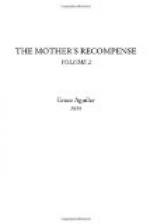Once more, but once, we will glance within the halls of Oakwood, and then will we bid them farewell, for our task will be done, and the last desires of fancy, we trust, to have appeased.
It was in the September of the year 1830 we closed our narrative. Let us then, for one moment, imagine the veil of fancy is upraised on the first day of the year, 1838, and gaze within that self-same room, which twenty years before we had seen lighted up on a similar occasion, the anniversary of a new year, bright with youthful beauty, and enlivened by the silvery laugh of early childhood. But few, very few, were the strangers that this night mingled with Mr. Hamilton’s family. It was not, as it had been twenty years previous, a children’s ball on which we glance. It was but the happy reunion of every member of that truly happy family, and the lovely, mirthful children there assembled were, with the exception of a very few, closely connected one with another by the near relationship of brothers, sisters, and cousins. In Mr. and Mrs. Hamilton, Mrs. Greville, Montrose Grahame, Lucy Harcourt, and Mr. Morton, who were all present, time had comparatively made but little difference; but it was in those who twenty years before had so well acted the part of youthful entertainers to their various guests that the change was striking, yet far, very far from being mournful.
On one side might be seen Percy Hamilton, M.P., in earnest yet pleasurable conversation with Mr. Grahame. It was generally noticed that these two gentlemen were always talking politics, discussing, whenever they met, the affairs of the nation, for no senator was more earnest and interested in his vocation than Percy Hamilton, but certainly on this night there was no thoughtful gravity of a senator imprinted on his brow; he was looking and laughing at the childish efforts of the little Lord Manvers, eldest child of the Earl of Delmont, then in his seventh year, to emulate the ease and dignity of his cousins, Lord Lyle and Herbert and Allan Myrvin, some two or three years older than himself, who, from being rather more often at Oakwood, considered themselves quite lords of the soil and masters of the ceremonies, during the present




